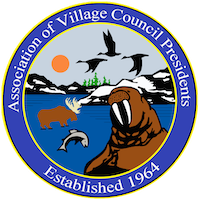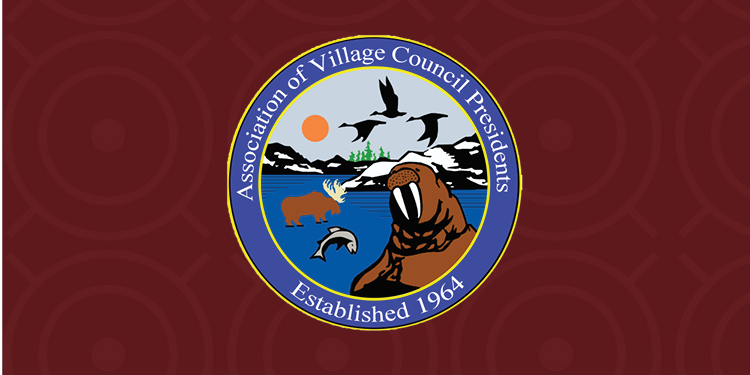April 8, 2024
AVCP Calls for Innovative Thinking to Fight the Ongoing Salmon Crisis
Anchorage, Alaska- The Association of Village Council Presidents (AVCP) leadership brought powerful testimony to the North Pacific Fishery Management Council (NPFMC) meeting to bring attention to the dire salmon crisis which is impacting thousands of Native Alaskans.

The AVCP Subsistence Committee members were joined by AVCP Chair Thaddeus Tikiun Jr. and AVCP Chief Executive Officer Vivian Korthuis. The testimony included:
Julia Dorris
“I cannot imagine a life without salmon in my smoke house and in my freezer. We used to live at our fish camps all summer, now we are luck if we are fishing for a month.
Gas prices and food prices are so high right now. We depend more on fish and moose for our food like our ancestors have done before us. The fishing industry came and negatively impacted our way of life and the food we eat.
Sometimes I feel like aI speaking to deaf ears. We travel from our small villages and testify pleading for our fish, then return home and continue to be regulated. That cycle has to stop. Listen to us, help us so we all have fish forever.”



Martin Andrew
“We use subsistence fishing to connect with our families and our elders. The story is much more than that. It is a story of our families, communities, our togetherness, our resilience.
We depend on our salmon for our native communities. For our cultural identity, and well-being and our food security. Costs of living are high in rural Alaska. We rely on the water and land for our survival.
For generations we have been stewards and protectors of our natural resources.
The priority should be to reduce or eliminate bycatch and protect salmon.
We are not asking for anything more and less than for what a human being needs for survival. We are asking for the right to protect our food sources and to do the best we can within our control to preserve and rebuild stock.
As a council you have a responsibility to us and our communities. You were entrusted with listening to us and to help us protect our food sources.”



Christina Changsak
“We haven’t fished for 4 or 5 years and that is hurting all of us subsistence ushers who rely on the land.
We gather by the seasons and it in our freezers to support our families. This has been our tradition for years and I would like to pass this down to my children and grandchildren.
We live in a community which has no road system, so everything comes in by plane and if the weather is bad the local stores run out. We rely on subsistence.”

Ray Oney
“We are not in support of any one alternative, more goals and objectives are needed to rebuild the chinook and chum stocks in the AYK region.
Native communities have relied on the subsistence way of life for generations. We follow the seasons.
The salmon shortage is a dire situation-a crisis which is threatening who we are as a people. Salmon is a main source of sharing in our culture as well.”
We are asking to protect out food sources and protect our food source.”

Joseph Joseph
“Growing up at our fish camp, our parents limited our subsistence catches just enough to sustain us through the winter. Now, there are no such subsistence activities in the Yukon River.
The by-catch reports are just numbers, they do not take a full look at the full picture.”



Thaddeus Tikiun, Jr.
“It is up to you all sitting at the table to make the right decision something that is fair for all the users. Sometimes I feel like the only time I am recognized is during my three minutes at hearings like this.”
At some point someone must make a call. We have sacrificed along the rivers allowing and conserving salmon voluntarily to let salmon pass to the spawning grounds.
We, the subsistence users bear the burden in the use of all natural resources. and we have to fight both the state and federal authorities just to subsists.”



Vivian Korthuis
Our communities rely on the Yukon and Kuskokwim Rivers and the Bering Sea for food. Salmon is our way of life. We are Salmon people. It is our cultural identity.
Right now, our cultural identity is under attack. Our subsistence way of life is being questioned. We will not sit silently and watch this happen.
The situation is dire. In my opinion, we are witnessing a humanitarian crisis in our own State of Alaska.
This crisis is not fast acting like a war, but a slow elimination of not only people and unique indigenous cultures, but a whole ecosystem that supports salmon on the North American Continent.
We are asking that you make transformative decisions to help our communities-just as the Council should help any other stakeholder that comes before you.
In our review of the report, we did not see engagement with our communities. I did not see conversations with our Elders and Tribes.
I did not see use of our Indigenous Knowledge to help support or defer any alternative presented. This cannot continue.
My ask is that the North Pacific Fisheries Management Council meet and come to Bethel to hear directly from our tribes and communities about the Salmon Crash including the EIS.
Change needs to happen. The status quo cannot be continued. Our communities are suffering and hungry, our resources are wasted, and our cultural identity is dying.
As a Council, please do not ignore what you hear from even the smallest of villages. I am asking that you take everything we are saying into consideration when you make your decisions.
In closing, our villages in the AYK region are experiencing a devastating salmon crash. It has touched every household and every family in our region.
Spring Breaking Up is just a month away. This time of the year is when we start preparing to put salmon away for food. Are we going to see another fishing season with not enough salmon?”







